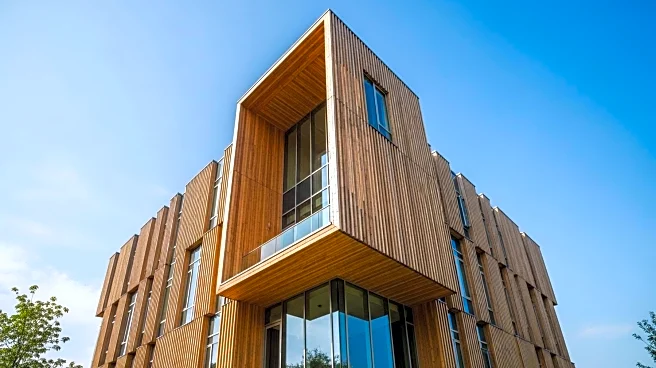What's Happening?
Canada is exploring ways to align its carbon accounting practices for mass timber construction with global market standards. The town of Lytton, British Columbia, which was devastated by fire in 2021, is serving as a pilot project for incorporating carbon storage in building designs. The use of mass timber, which sequesters carbon, is being considered in building codes to address climate change. The Canadian model aims to require whole-building life cycle assessments compatible with export markets, set compliance caps on fossil emissions, and encourage dynamic reporting of carbon storage. This approach seeks to balance transparency in national accounting while enhancing competitiveness in international markets.
Why It's Important?
Aligning Canada's carbon accounting practices with global standards is crucial for the competitiveness of its timber industry. By demonstrating low embodied emissions and effective carbon storage, Canadian timber products can gain acceptance in European and Asia-Pacific markets, which are increasingly demanding low-carbon materials. This alignment not only supports Canada's climate goals but also strengthens its position in the global market, potentially leading to increased exports and economic growth. Additionally, credible carbon accounting can reassure insurers, lenders, and public funders, thereby accelerating the adoption of mass timber construction domestically.
What's Next?
Canada is expected to continue refining its carbon accounting framework, with the 2025 National Building Code introducing greenhouse gas objectives focused on operational emissions. Provinces like Vancouver are already setting embodied carbon caps, and similar measures are being considered in Quebec and British Columbia. The Lytton rebuild project will serve as a model for implementing these practices at scale, providing insights for federal and provincial programs. As Canada aligns its carbon accounting with international standards, it will likely see increased demand for its timber products, driving further innovation and investment in the sector.
Beyond the Headlines
The integration of carbon accounting in building codes highlights the ethical and environmental responsibility of the construction industry. By prioritizing sustainable practices, Canada is setting a precedent for other countries to follow, potentially leading to a global shift towards greener building materials. This approach also underscores the importance of preserving natural resources and promoting biodiversity, as sustainable forestry practices are essential for maintaining carbon stocks. The long-term implications include fostering a culture of sustainability within the construction industry and encouraging other sectors to adopt similar practices.











